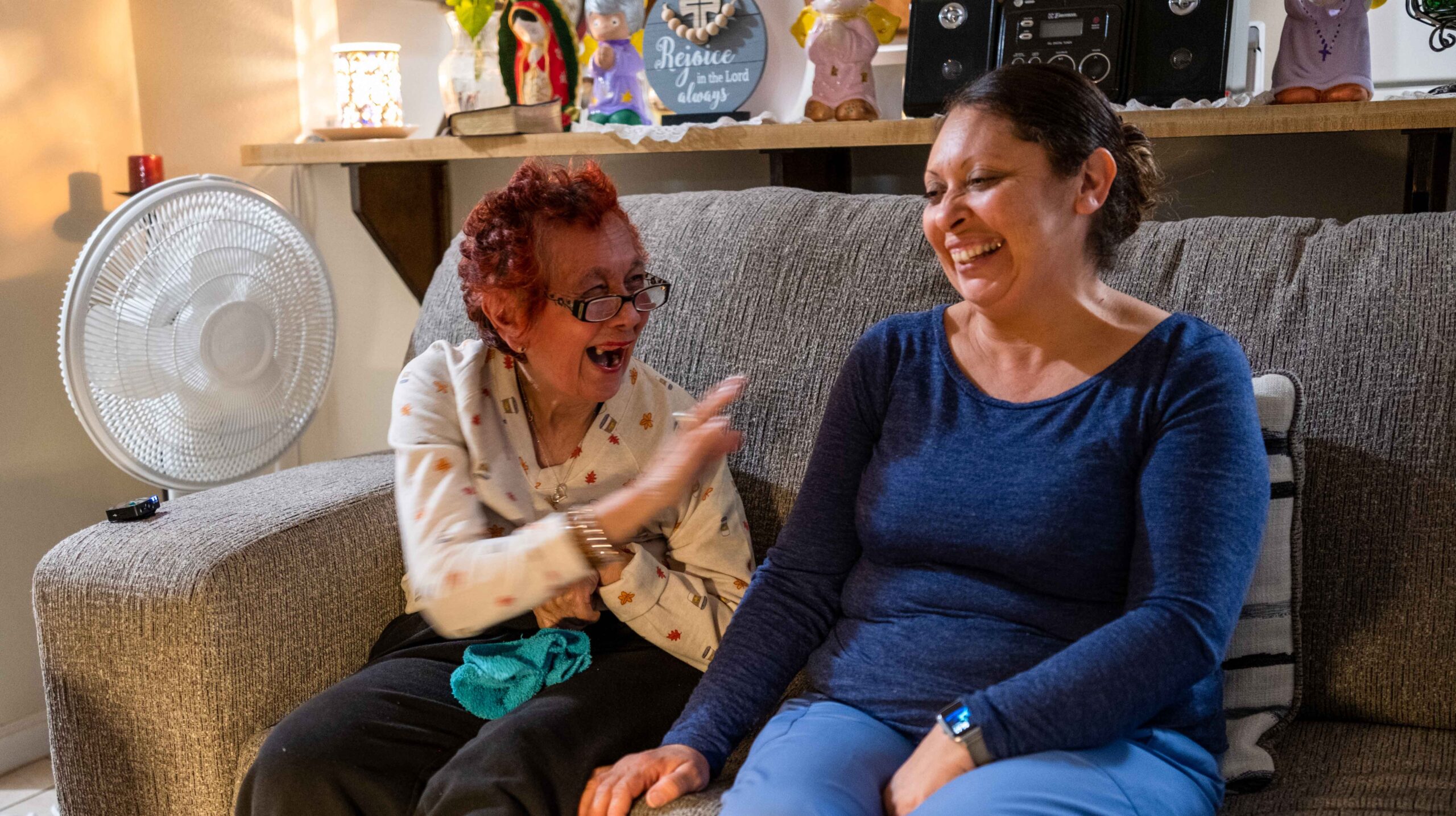

Health and aging policies and systems are typically designed from the perspective of people who run systems, rather than those who use them. Even when advocates, policymakers, and providers do seek to learn from older adults, those engagements often have significant limitations: existing datasets and surveys do not adequately focus on priority populations or capture the lived experience of older adults, and their insights often remain siloed within commissioning organizations and agencies.
To address the problems above, we partnered with The SCAN Foundation to form a pool of older adults to engage with The People Say, a qualitative database designed to help policymakers hear the voices of the public when shaping policy. We developed qualitative data on their preferences and experiences, then launched the platform to highlight actionable findings and insights about older adults’ health and wellbeing needs.
Specifically, we created:
3) The People Say, an online platform that publicly shares out findings and insights generated with those older adults regarding their healthcare access and delivery experiences, designed to highlight opportunities for national policy change and nationwide healthcare-systems improvement.
Older Adults
Communities
Findings
We planned a sample of 65 older adults, in a nod to the estimated population of 65 million Americans over the age of 65 in 2025. Ultimately, we engaged 66 older-adult participants, along with seven caregivers and 13 subject-matter experts, for a total of 86 participants.
Beyond seeking to highlight lives and aspirations of all older Americans, the Public Policy Lab and The SCAN Foundation share a commitment to focusing on the life experiences, needs, and preferences of populations that experience health disparities – particularly people of color, low-income people, and people who live in rural, medically underserved areas.
To deepen our research on these populations, we oversampled for participants that had those backgrounds or characteristics, with the aim of hitting levels equal or greater to the projections of the demographics of America in 2040. That forward-looking focus allowed our participant pool to speak to the more diverse future that America is aging into, serving project interests in developing policy now that addresses the needs of the next 15 to 20 years.

According to the US Dept. of Health and Human Services’ Administration for Community Living, in 2020, 51% of Americans aged 65 and older lived in nine states: California, Florida, Texas, New York, Pennsylvania, Ohio, Illinois, North Carolina, and Michigan. We conducted in-depth human-centered research activities in five of those states – California, Texas, New York, Pennsylvania, and Ohio – as well as in Iowa and Alabama.
The locations represent diverse geographic areas, population densities, political leanings, and U.S. Dept. of Health & Human Services (HHS) regions. We additionally selected four states in which more than 10.7% of the population is dually eligible for Medicare and Medicaid.
By concentrating research in a set of locations, rather than finding 66 participants in 66 different places, we sought to gather community-level trends, in addition to individual-level experiences. Ultimately, we were able to observe that some topics were more prevalent in each of our locations than in others.
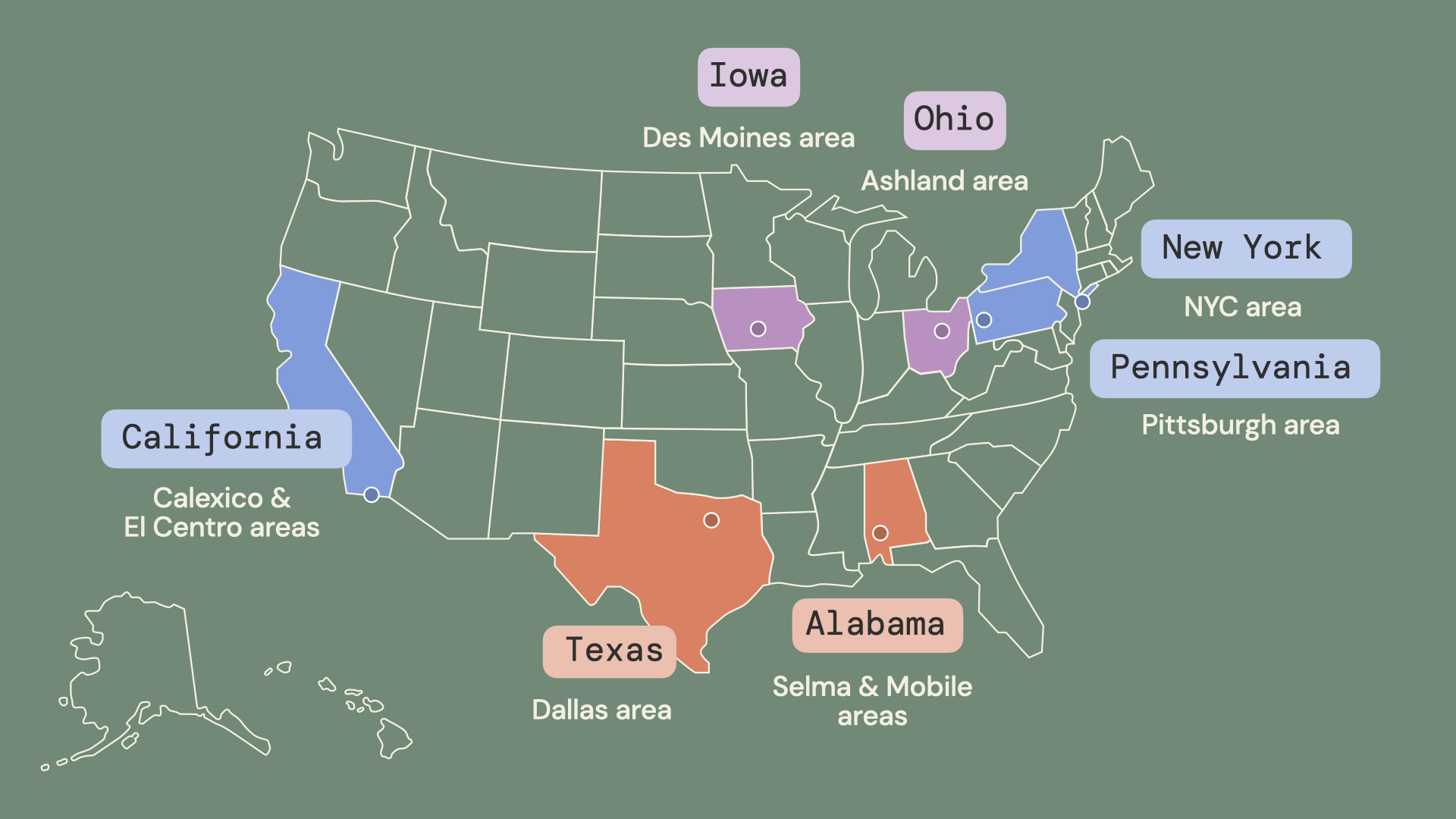
Research Locations
Research took place in seven diverse communities across the country.
Inquiry areas are broad topics or categories of knowledge that we hope to better understand through research. Inquiry areas apply to all participant or stakeholder types, and they are used to inform research methodologies, discussion guides, and desk research.
To develop our inquiry areas for the Public Prospective Longitudinal Understanding Study of 65+ Adults, PPL collaborated with The SCAN Foundation staff and also examined precedent surveys and studies of older adults. We identified four areas of interest that we believed could be further illuminated through qualitative human-centered design research (see illustration below). These inquiry areas guided our research engagements with older adults, their caregivers, and subject-matter experts.
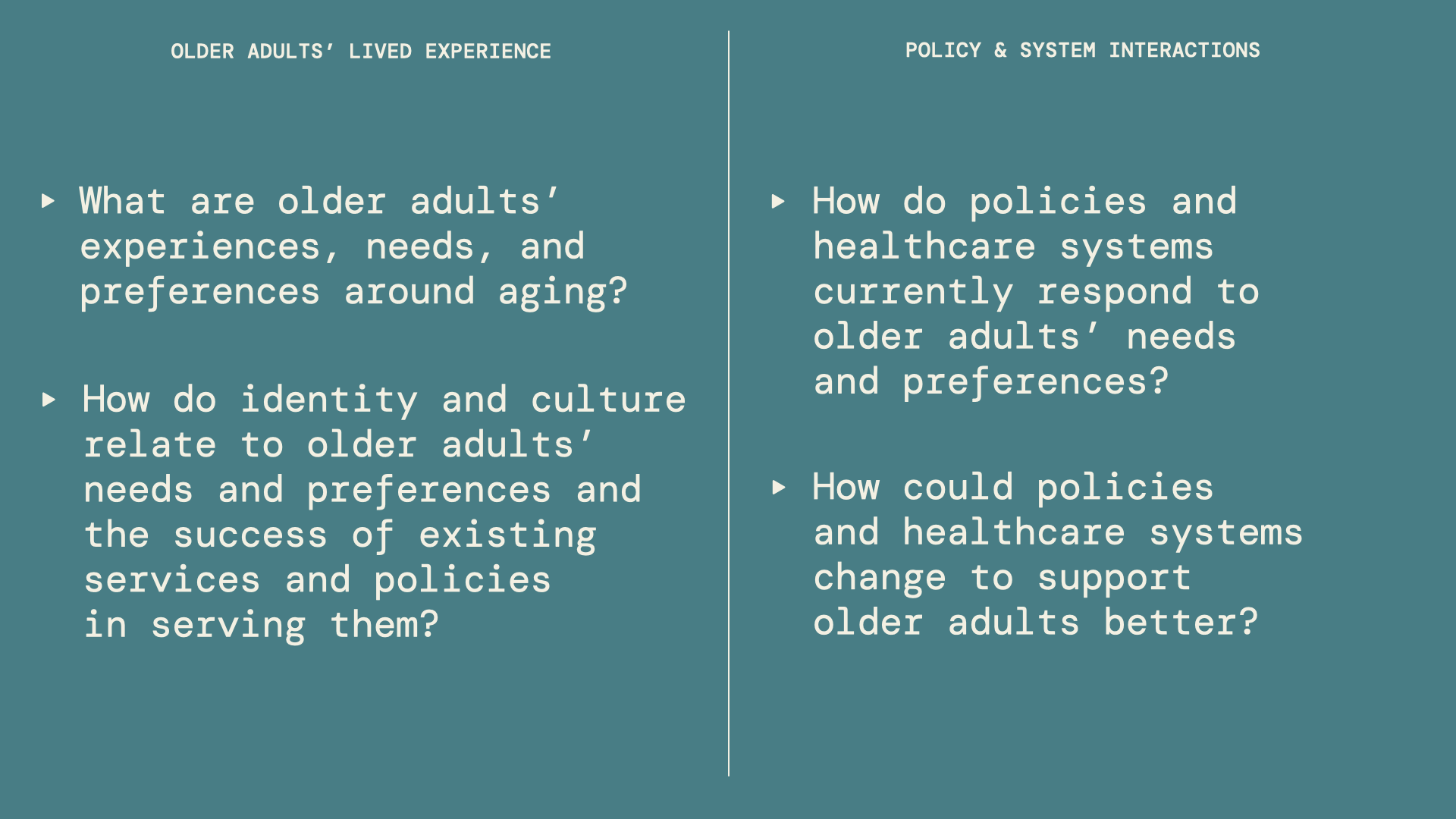
We recruited our cohort of 66 older adults through Area Agencies on Aging, local senior centers, and institutional and academic connections of the project’s 25-member advisory committee. Recruiting materials were also distributed on social media and printed and posted at high-traffic areas at community-based organizations’ physical locations and other community hubs.
All participant-facing materials were written in plain language to ensure they were accessible to a wide range of participants. Key materials were also translated into Spanish and Chinese (both traditional and simplified) in order to reach participants whose primary language is not English.
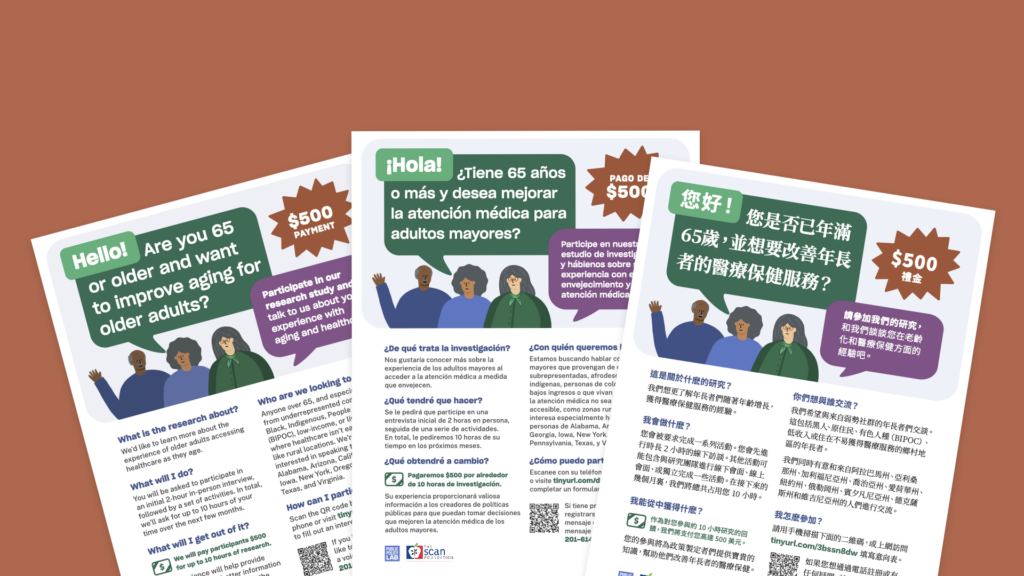
Semi-Structured Interviews
Pairs of researchers conducted semi-structured interviews in participants’ homes or in agreed-upon community spaces, such as senior centers, churches, and libraries.
Before beginning, we walked participants through a comprehensive consent process that explained the project, described how the information collected would be used, and offered contact information for questions or concerns. While all PPL projects include a detailed consent process, this project required special care, given that we were asking participants to consent to public sharing of their data. While we had specifically recruited participants who were open to public sharing, a few participants did decide, during the consent process, that they were not willing to have their face and/or voice be recognizable in shared outputs; we either filmed them without capturing their face, or we subsequently blurred or disguised their visage and/or voice in material posted to the public platform.
Our in-depth interviews focused on older adults’ experiences of aging and accessing healthcare and other services. Our goal in semi-structured interviews was to use our inquiry areas as a guide, but not to follow a predetermined script or matrix of questions. We aim to create an environment where participants feel comfortable, allowing our professional qualitative researchers to explore interesting stories as they emerge during the engagement. We carried lightweight equipment—just a tripod, light, and small microphones—to minimize the intrusiveness of recording.
Teams traveled directly to participants for these in-depth conversations, leaving behind a packet of independent activities to be completed over the following weeks and returned by mail. Our researchers conducted interviews in English, Spanish, or Cantonese, and activity materials were provided in the participants’ preferred language.
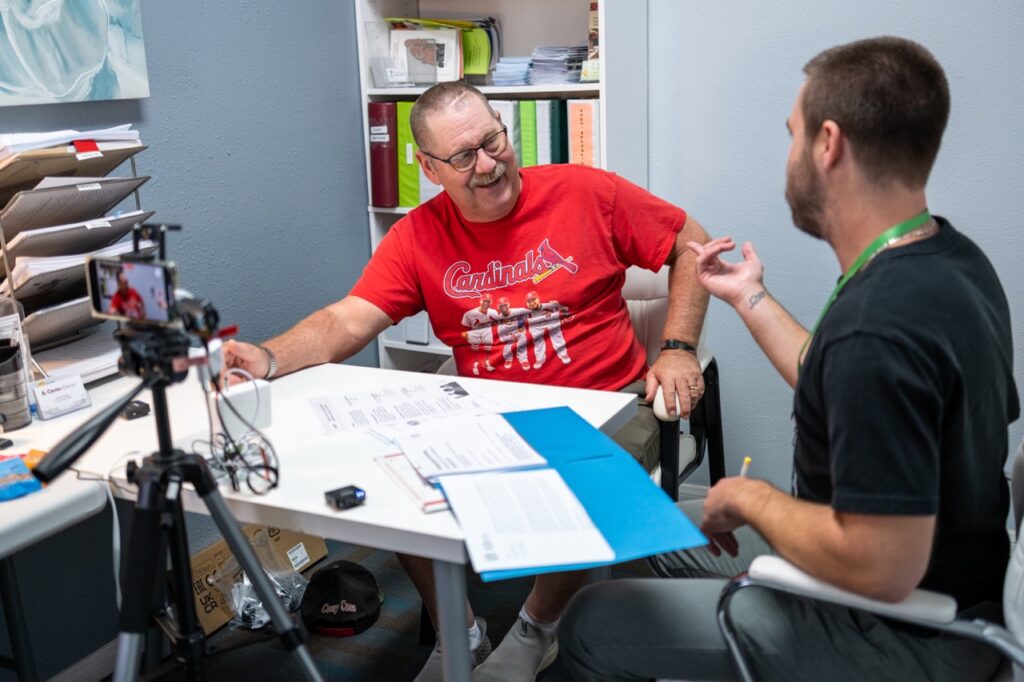
Cultural Probes
The first activity we provided for participants to complete on their own was called Who I See. It asked them to map their social network by filling out worksheets about the people they see on a daily, weekly, or monthly basis, including friends, family, and care staff, and also to describe what those interactions are like and how they feel.
The second activity, My Life Timeline, prompted older adults to chart their lifetime milestones of aging—along with their hopes for the future—and to provide more detailed explanations about a few of those moments.
Almost all of our participants returned these materials to the research team, and they are fascinating windows into people’s past experiences and current social networks. We have included scans of the timelines on the public platform, scrubbed of personally identifying information. The social-network probe artifacts proved too challenging to make publicly available, given references to names and details of non-consented members of our participants’ community; these materials were used to inform our insight briefs, however, and could be further analyzed in future rounds of research.
All older-adult participants were provided with copies of all their data units, in their original language, in advance of site launch. We asked them to indicate if there were any items that they did not want to have published. Based on this review, we removed three units of data, from one participant. All of the nearly 2,400 data units remaining on the site have been approved for public sharing by the participants.
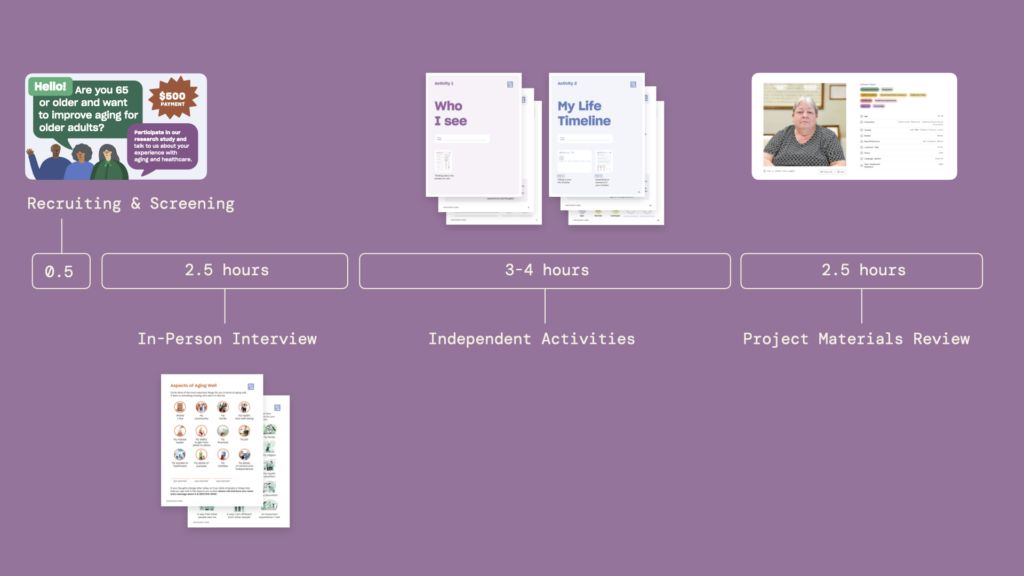
Completed Activities
Participants sat for interviews, completed independent worksheets, and reviewed site data.
Research Compensation
Older-adult and caregiver participants who took part in all activities provided about ten hours of their time. Participants received $200 for the initial interview and received up to a total of $500 if they participated in follow-on activities. Expert members of our advisory committee were also asked for about 10 hours of time and were offered an equivalent honorarium (which many declined). Our $50-per-hour compensation rate is intended to match or exceed the rate of pay of an entry-level PPL staff researcher.
To address the problem that health and aging policies and systems are not designed, foremost, to respond to user needs and preferences, we formed a pool of older adults engaged with The People Say for ongoing human-centered research. We developed qualitative data on their preferences and experiences, then launched a platform – designed for use by advocates, policymakers and other stakeholders – to highlight actionable findings and insights about older adults’ health and wellbeing needs.
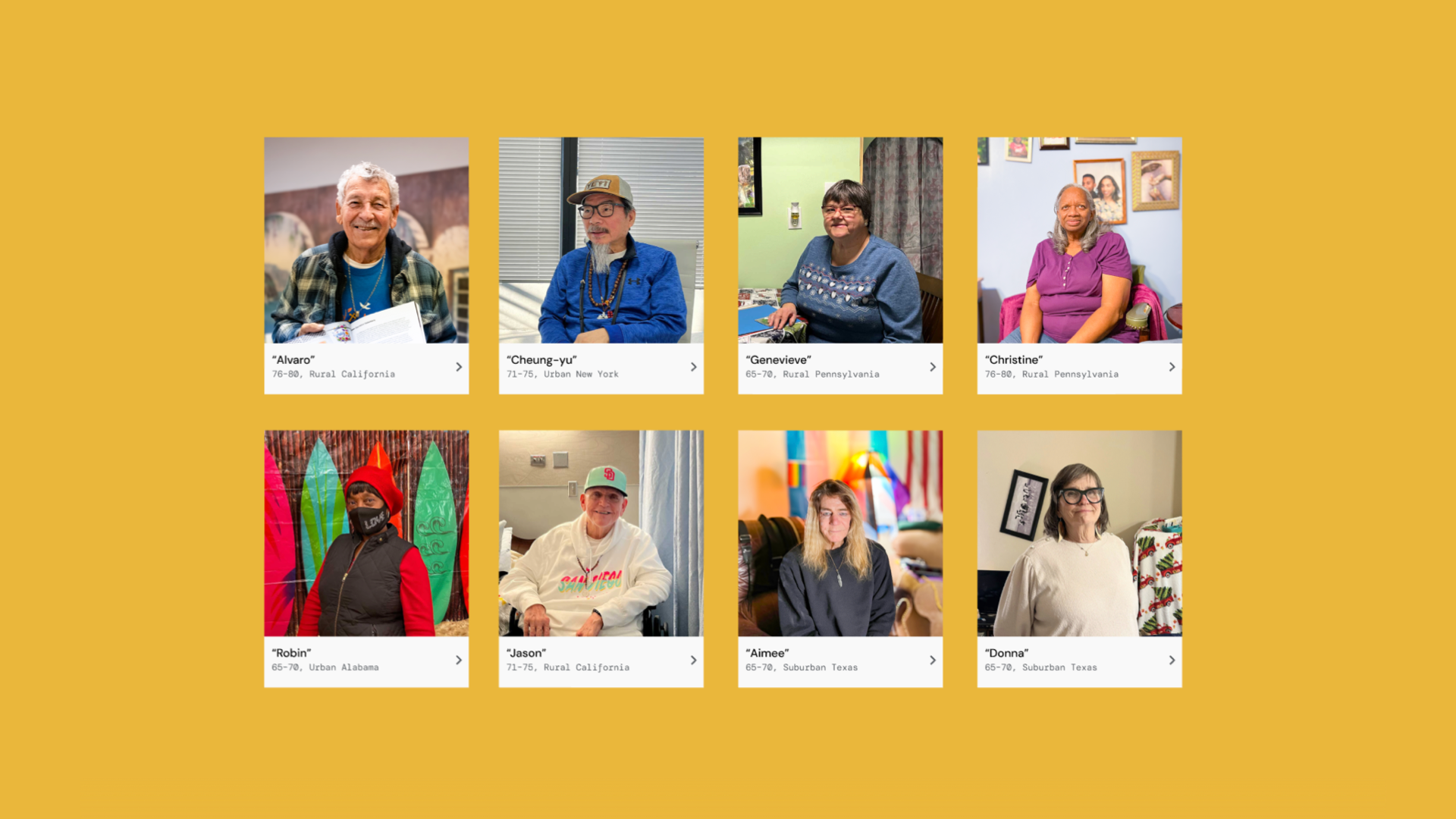
A research pool of older adults—representative of all older Americans, but over-sampled on marginalized populations – with the intention and related infrastructure to be able to return to that pool regularly over time, both to conduct follow-on research related to this project and also to address other specific research questions;

A repository of tagged research data, including both synthesized insights from research and direct quotes, transcripts, photographs, audio and video recordings, and or other artifacts from research with – or created by – members of the pool of older adults, all categorized per a taxonomy to be developed by the research team; and

The People Say, an online platform, to publicly share out findings and insights generated with those older adults regarding their healthcare access and delivery experiences, designed to highlight opportunities for national policy change and nationwide healthcare-systems improvement.
Taxonomy and Tagging
A primary goal of The People Say is to provide access to a qualitative dataset that enriches and expands on the quantitative data about older adults that’s typically referenced by policymakers. To make our data more directly associable with existing quantitative data, our 108 topic and subtopic tags were developed with reference to the primary keywords or taxonomies used by five major longitudinal studies of American older adults, specifically:
With those studies as a starting point, we developed a taxonomy to categorize the content included on The People Say. Every data unit included in our database is tagged per this taxonomy. You can filter our database by these tags when you search the database; additionally, on any given data-unit page, clicking on any topic or subtopic tag will generate a result of all data on this site with that tag.
To make it easy to find quantitative data that augment our qualitative data, on each one of our data units, we’ve also provided links to related data in summary reports from the sources above (except the MCBS, which doesn’t have an easy-access summary report).
Approximately 40% of our subtopic tags do not have related data in the quantitative surveys. We think this speaks to the meaningful difference in the kind of data that in-person, human-centered research can generate. Our participants shared aspects of their lived experience that survey instruments are unlikely to collect.
Development and Testing
The People Say has been designed primarily for three major user groups: 1) legislators, policymakers, and their staff; 2) federal, state, and local program leaders; and 3) researchers and advocates. Our 25-member advisory committee includes representatives of all of these user types, and they helped us iterate on the tagging taxonomy, even before we began site development. As an example, federal policymakers and program leadership felt that it was important to be quite specific in tagging data related to different various federally funded benefits programs, so we have specific tags for Medicare, Medicaid, veterans’ programs, etc. Once in development, we also tested with users recruited from the workplaces of our advisory committee members at two different stages of development.
While focused on those three primary user groups, we’ve also designed the site to be usable by older adults and anyone seeking to learn how to better support their aging loved ones and community members—and what to expect when growing older themselves. While we did less user testing for these user groups, we did conduct sessions with several of our older-adult participants who use websites (only about a quarter of our participants are comfortable using online tools). We tested their ability to navigate the site, review their data, and also review that of others; this user testing, as expected, provided some useful additional information around accessibility and ease of use.

We launched the site on July 11, 2024, at the U.S. Capitol – an opportunity provided to us based on the relationship between a partner at The SCAN Foundation and the Senate Committee on the Aging. In attendance were staff from two House and Senate committees, member staff from the offices of three senators and four representatives (five Democrats and two Republicans), representatives from six federal agencies, and staff from 22 research, advocacy, and stakeholder organizations.
We were also joined by two of our research participants and their family members – from Iowa and Pennsylvania – and we conducted a Q&A with them about their stories, their participation in the project, and what they hoped policymakers and program leaders would take away from hearing about their experiences of aging where they live.
Immediate Impact
Reaction to the launch has been very positive – and it’s already having an impact on efforts by the federal government to better incorporate older adults’ points of view in policy decision making. The Interagency Coordinating Committee on Healthy Aging and Age-Friendly Communities (ICC), established by the authority of the Older Americans Act, is developing a national framework on aging that can support older Americans in aging in place, while accessing preventive healthcare and long-term services and supports. A key goal of the ICC is to hear directly from older adults – particularly those with the greatest economic and social need – to ensure policies are reflective of needs and preferences.
Working with partners at The SCAN Foundation, a National Plan on Aging Community Engagement Collaborative partner with the ICC, PPL is currently gathering this input during the summer of 2024 by facilitating listening sessions that amplify the voices and lived experiences of older Americans. We’re organizing listening sessions in three of the communities where we established relationships during the creation of The People Say, and existing members of our participant pool have been invited to join those sessions. During the listening sessions, older adults will meet with federal officials and discuss aging and the four domains in the national framework: Age-Friendly Communities, Coordinated Housing and Supportive Services, Increased Access to Long-Term Services and Supports, and Aligned Health Care and Supportive Services.
We think that this example – of policymakers’ direct engagement with older adults’ experiences – points to the immediate value of constituting ongoing research pools for civic research.
I commend The SCAN Foundation and the Public Policy Lab for engaging in this project. This project will result in a valuable asset for researchers and policymakers that will fill an important gap in our resources."
— Federal Policymaker
PPL is a tax-exempt 501(c)(3)
nonprofit organization.
info@publicpolicylab.org
+1 646 535 6535
20 Jay Street, Suite 203
Brooklyn, NY 11201
We'd love to hear more. Send us a note and we'll be in touch.
We're currently seeking applications for a Graduate Summer Intern. If interested, learn more about the role here.
To hear about future job announcements, follow us on Instagram, Twitter, Threads, and LinkedIn or subscribe to our newsletter.
Enter your email below to subscribe to our occasional newsletter.
Wondering what you’ve missed?
Check out our
The Public Policy Lab is a tax-exempt
501(c)(3) nonprofit organization.
Donate now to support our work; your
gift is tax-deductible as allowed by law.